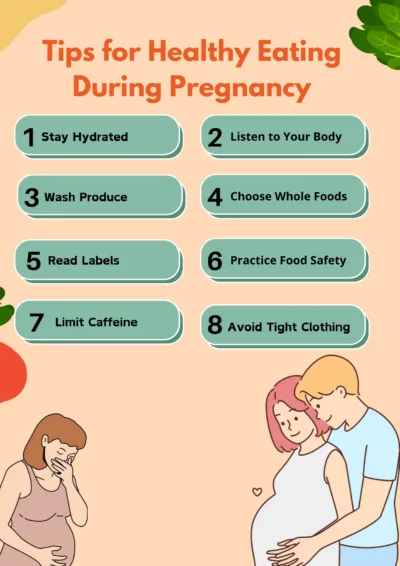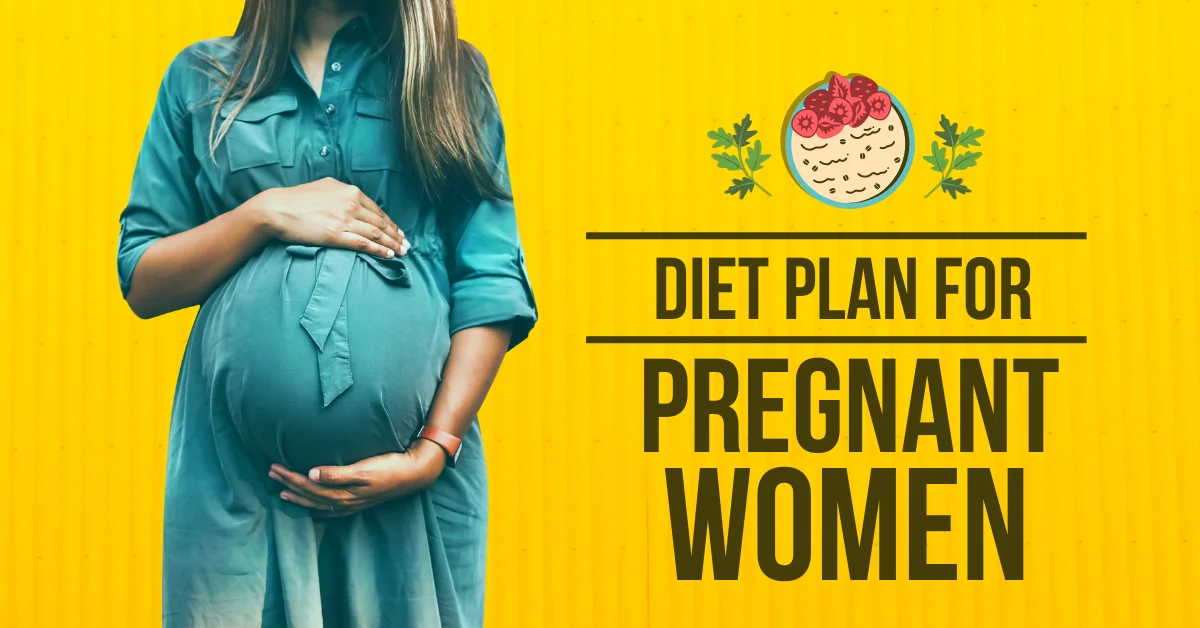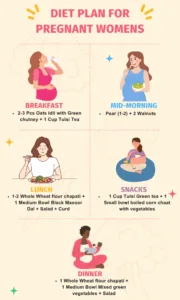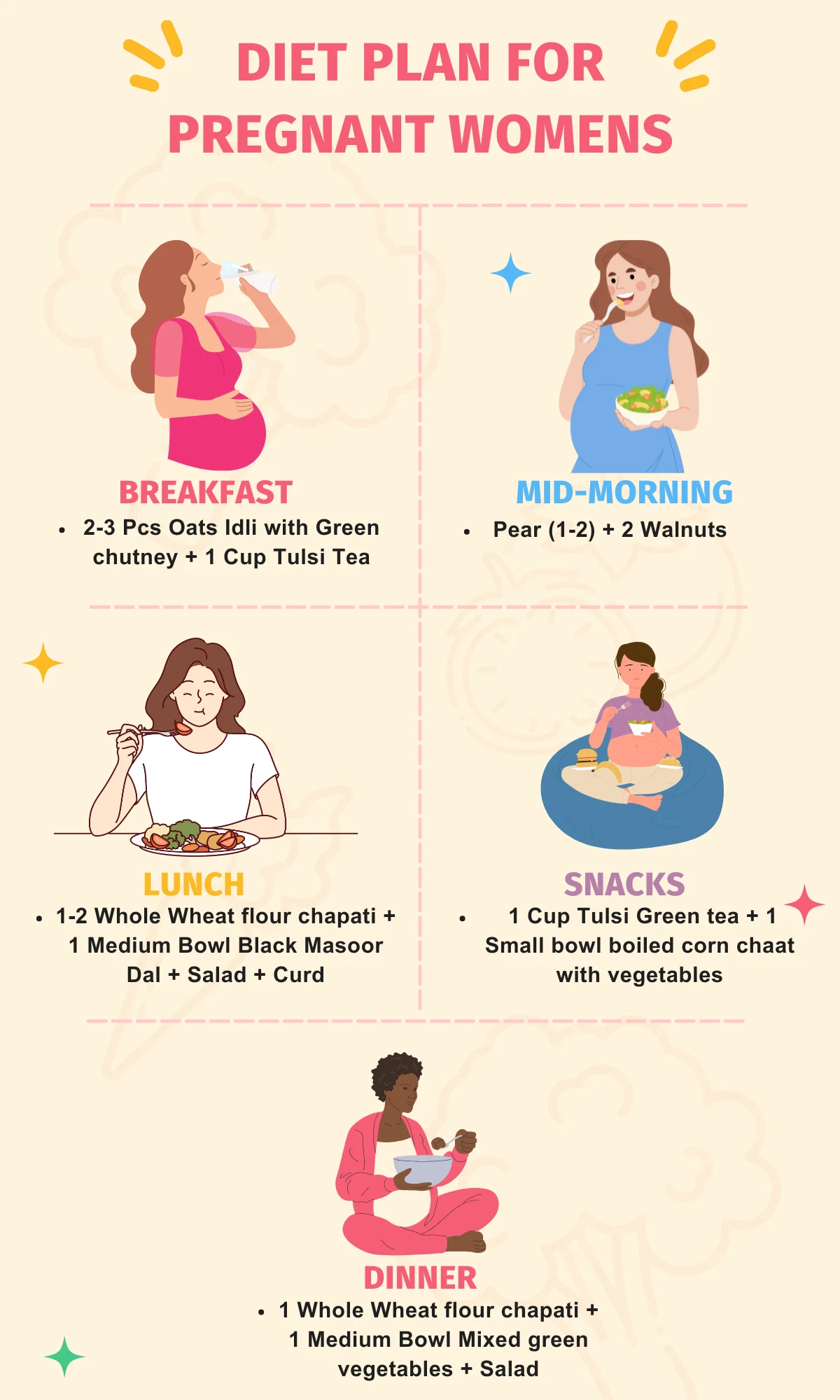Congratulations on your pregnancy! Eating a healthy diet is crucial for both you and your developing baby. A well-balanced diet plan for pregnant women provides essential nutrients to support your baby’s growth and development while keeping you healthy throughout your pregnancy.
This page will guide you through creating a personalized diet plan for your pregnancy journey. We’ll cover essential nutrients, recommended food groups, sample meal plans, and tips for healthy eating habits. Remember, consulting with a registered dietitian or healthcare professional is recommended to tailor a plan that suits your specific needs and preferences.
Diet plan Packages for Pregnant Women
Fitness package
- Customised Meal Plan For Weight Loss
- BMI calculator
- BMR calculator
- WhatsApp Support
- Prakriti Analysis
- Follow up
- Weight Maintenace
3 Months Plan
- Basic diet chart with options for each meal
6 Months Plan
- Customised daily plan given on weekly basis
1 year plan
- Customised daily plan given on weekly basis
Diet plan Packages for Pregnant Women
3 Months Plan
- Basic diet chart with options for each meal
- BMI calculator
- BMR calculator
- WhatsApp Support
- Prakriti Analysis
- Follow up
6 Months Plan
- Customised daily plan given on weekly basis
- Customised Meal Plan For Weight Loss
- BMI calculator
- BMR calculator
- WhatsApp Support
- Prakriti Analysis
- Follow up
- Weight Maintenace
1 year plan
- Customised daily plan given on weekly basis
- BMI calculator
- BMR calculator
- WhatsApp Support
- Prakriti Analysis
- Follow up
- Weight Maintenace
Physical changes during pregnancy
Pregnancy is a joyful moment, but sometimes it can also be very painful. During pregnancy, you may face various struggles such as:
- Exhaustion: Feeling extremely tired is common.
- Breast Pain: Your breasts may become sore and tender.
- Urinary Problems: You might experience frequent urination. Pregnancy puts pressure on your bladder, and increased blood flow means your kidneys process more fluid, leading to more trips to the bathroom.
- Constipation: Changing hormone levels, particularly increased progesterone, can slow down your bowels. Morning sickness can also alter your eating habits, contributing to constipation.
- Unusual Cravings: Pregnant people often crave unusual food combinations like pickles and ice cream. You might desire chocolate on sushi or peanut butter with pancakes, and some even crave non-food items like dirt. Food aversions can also occur, making your favourite foods suddenly unappetizing.
- Nausea and Vomiting: Known as morning sickness, nausea can strike at any time of day. Increased estrogen levels in early pregnancy stimulate a part of the brain that triggers nausea and vomiting.
Tips for Healthy Eating During Pregnancy
- Stay Hydrated: Drink plenty of water to support your body’s functions.
- Listen to Your Body: Eat when hungry, stop when full, and avoid calorie restriction without professional advice.
- Wash Produce: Thoroughly wash fruits and vegetables to prevent foodborne illness.
- Choose Whole Foods: Opt for whole grains, fruits, vegetables, and lean proteins.
- Read Labels: Check serving sizes and avoid foods high in added sugars, unhealthy fats, and sodium.
- Practice Food Safety: Cook meat and seafood properly to avoid contamination.
- Limit Caffeine: Moderate caffeine intake and consult your doctor for guidance.
- Avoid Tight Clothing: Opt for loose-fitting clothing to allow for comfort and proper circulation during pregnancy.

1st Pregnancy vs 2nd Pregnancy
Pregnancy is a roller coaster ride of emotions for a woman. Even so more if it’s a first pregnancy. A woman goes through some drastic physical and emotional struggles and it sometimes causes depression in pregnant women. That does not mean the second pregnancy is hassle-free but yes she is now stronger mentally and also physically. For some women, a second pregnancy is more difficult than the first one so one can not firmly say that a second pregnancy is easier than the first one.
Essential nutrients for pregnant women trimester-wise
During pregnancy, it’s important to eat a variety of foods and fruits to ensure you and your baby get all the necessary nutrients to stay healthy. While it’s good to avoid foods with no nutritional value, like chips and soda, you don’t have to give up your favourite foods completely—you can balance them in your diet. Here are some essential nutrients you should include in your daily intake:
- Protein: Protein is crucial for the proper growth of your baby’s tissues and organs, including the brain. It also helps with the growth of breast and uterine tissue during pregnancy. You should aim to eat about 70 to 100 grams of protein a day.
Good sources of protein include: Lean beef and pork, Chicken, Salmon, Nuts, Peanut butter, Cottage cheese, Beans - Calcium: Calcium helps build your baby’s bones and regulates your body’s use of fluids. Pregnant women need 1,000 mg of calcium daily, ideally in two doses of 500 mg each.
Good sources of calcium include: Milk, Yogurt, Cheese, Low-mercury fish and seafood, such as salmon, shrimp, catfish, canned light tuna, Calcium-set tofu, Dark green, leafy vegetables - Iron: Ironworks with sodium, potassium, and water to increase blood flow, ensuring enough oxygen is supplied to both you and your baby. You should get 27 mg of iron per day, preferably with some vitamin C to help with absorption.
Good sources of iron include: Dark green, leafy vegetables, Citrus fruits, Enriched breads or cereals, Lean beef and poultry, Eggs
Eating a balanced diet with these nutrients will help keep you and your baby healthy throughout your pregnancy. Here are the basic foods you should eat during pregnancy. Now, let’s talk about what foods you should eat trimester-wise:
A) First Trimester
During the first trimester of pregnancy, it’s important to focus on key nutrients for the baby’s early development. Folate (Vitamin B9) is vital for building DNA and the baby’s brain and nerves. Aim for at least 600 micrograms (mcg) daily from foods like beans, spinach, kale, oranges, and grapefruits. Protein from lean meats, poultry, seafood, eggs, beans, nuts, and soy products helps the baby’s tissue growth. Calcium, found in dairy, fortified plant milk, broccoli, and bok choy, supports bone development with a daily goal of 1,000 milligrams (mg). Iron, from lean meats, beans, fortified cereals, and dark leafy greens such as spinach and collards, helps increase blood volume for both mom and baby. Including these nutrients daily sets a healthy foundation for pregnancy.
B) Second Trimester
During the second trimester of pregnancy, it’s crucial to maintain essential nutrients for both the baby’s growth and the mother’s health. Calcium remains important for strong bones and supporting the baby’s skeletal development, with sources like dairy products, fortified juices, and leafy greens providing the recommended 1,000 mg per day. Protein continues to be vital for a baby’s tissue growth and can be found in lean meats, poultry, fish, eggs, beans, and nuts.
Introducing omega-3 fatty acids becomes critical during this trimester to support the baby’s brain and eye development. These essential fatty acids are found in fatty fish like salmon, as well as plant-based sources such as walnuts and flaxseeds. Vitamin D is also essential for calcium absorption and maintaining bone health, obtainable from fortified foods and safe sun exposure. Together, these nutrients play a crucial role in supporting the baby’s growth and development during this important stage of pregnancy.
C) Third Trimester
As pregnancy progresses into the third trimester, maintaining a balanced intake of essential nutrients is crucial for both the pregnant individual and the baby. Iron intake remains important to support increased blood volume and oxygen transport to the baby, sourced from lean meats, beans, and fortified cereals to meet the daily 27 mg recommendation. Including fibre from fruits, vegetables, whole grains, and legumes helps prevent constipation, common in later pregnancy stages. Omega-3 fatty acids continue to support the baby’s brain development, found in fatty fish, chia seeds, and algae supplements. Vitamin K, crucial for blood clotting, is abundant in leafy greens, broccoli, and vegetable oils. By prioritizing these nutrients throughout pregnancy, individuals can maintain their health and promote.
Workout for pregnant women
Staying active during pregnancy can bring many benefits, like reducing stress, maintaining physical fitness, and preventing excessive weight gain. Along with aerobic exercises such as walking and swimming, it’s important to include muscle-strengthening exercises in your workout routine. However, safety is crucial:
- Get clearance from your doctor if you’re new to exercise or have any health conditions.
- Drink plenty of water before, during, and after exercise.
- Wear supportive clothing like a sports bra or belly band.
- Avoid overheating, especially in the first trimester.
workout routine trimester wise
A) First Trimester
During the first trimester of pregnancy, it’s important to focus on key nutrients for the baby’s early development. Folate (Vitamin B9) is vital for building DNA and the baby’s brain and nerves. Aim for at least 600 micrograms (mcg) daily from foods like beans, spinach, kale, oranges, and grapefruits. Protein from lean meats, poultry, seafood, eggs, beans, nuts, and soy products helps the baby’s tissue growth. Calcium, found in dairy, fortified plant milk, broccoli, and bok choy, supports bone development with a daily goal of 1,000 milligrams (mg). Iron, from lean meats, beans, fortified cereals, and dark leafy greens such as spinach and collards, helps increase blood volume for both mom and baby. Including these nutrients daily sets a healthy foundation for pregnancy.
B) Second Trimester
During the second trimester of pregnancy, it’s crucial to maintain essential nutrients for both the baby’s growth and the mother’s health. Calcium remains important for strong bones and supporting the baby’s skeletal development, with sources like dairy products, fortified juices, and leafy greens providing the recommended 1,000 mg per day. Protein continues to be vital for a baby’s tissue growth and can be found in lean meats, poultry, fish, eggs, beans, and nuts.
Introducing omega-3 fatty acids becomes critical during this trimester to support the baby’s brain and eye development. These essential fatty acids are found in fatty fish like salmon, as well as plant-based sources such as walnuts and flaxseeds. Vitamin D is also essential for calcium absorption and maintaining bone health, obtainable from fortified foods and safe sun exposure. Together, these nutrients play a crucial role in supporting the baby’s growth and development during this important stage of pregnancy.
C) Third Trimester
As pregnancy progresses into the third trimester, maintaining a balanced intake of essential nutrients is crucial for both the pregnant individual and the baby. Iron intake remains important to support increased blood volume and oxygen transport to the baby, sourced from lean meats, beans, and fortified cereals to meet the daily 27 mg recommendation. Including fibre from fruits, vegetables, whole grains, and legumes helps prevent constipation, common in later pregnancy stages. Omega-3 fatty acids continue to support the baby’s brain development, found in fatty fish, chia seeds, and algae supplements. Vitamin K, crucial for blood clotting, is abundant in leafy greens, broccoli, and vegetable oils. By prioritizing these nutrients throughout pregnancy, individuals can maintain their health and promote.
Questions & Answers Related to Pregnant women
Q1) Does Age Affect Pregnancy
A woman’s age significantly influences her fertility. she is born with a fixed number of eggs that age alongside her, both in quantity and quality. this aging process reduces the likelihood of conceiving and having a healthy pregnancy. in her early to mid-20s, a woman typically has a 25–30% chance of becoming pregnant each month. fertility begins to decrease gradually in her early 30s, with a sharper decline after age 35. by age 40, the chance of conceiving in any given monthly cycle drops to about 5%. while good health can enhance fertility to some extent, it cannot fully counteract the impact of age on a woman’s reproductive capabilities.
Q2) Does Every Pregnancy Cause Depression
Depression is a common and treatable mood disorder affecting about 6% of women at some point in their lives, with up to 10% experiencing it during pregnancy. Women are more vulnerable to depression during pregnancy and in the postpartum period, often overlapping with symptoms mistaken for typical pregnancy changes or “baby blues” immediately after birth.
The positive news is that depression can be effectively managed with proper treatment. It’s crucial to discuss any concerns with your doctor if you suspect you may be experiencing depression. Untreated depression can pose risks for both the mother and child, underscoring the importance of seeking timely support and care.
Q3) Is It True That Pregnant Women Should Eat For Two Person
One common misconception about pregnancy and eating is the idea of “eating for two.” While it’s true that your baby depends on your nutrition, you don’t need to double your food intake during pregnancy. In fact, eating too much can lead to complications.
Many women tend to overeat during pregnancy. A 2015 government report showed that 47% of American moms gain too much weight during pregnancy, with New Mexico at 49%.
Weight gain is normal during pregnancy, but finding the right balance can be challenging. A British survey found that nearly 70% of pregnant women were unsure about how many extra calories they should consume
Q4) Why The Number Of The C Section Has Increased Lately.
The rise in C-sections is due to both medical and non-medical reasons. Medical factors include women having children later in life, which increases the chances of needing a C-section. Additionally, more multiple births (like twins or triplets) and higher rates of obesity contribute to the need for C-sections. Women who have had a previous C-section are also more likely to have another. The impact of COVID-19 on pregnancy may also play a role, as there is some evidence suggesting an increase in C-sections during the pandemic.
Non-medical factors include patient preference, where some women choose C-sections to have more control over the delivery date or due to a fear of vaginal childbirth. Doctors might also recommend C-sections based on their assessment of potential risks. Socioeconomic factors also play a role, with studies showing that better-educated women and those in urban areas are more likely to have C-sections, possibly due to better access to healthcare and private insurance.
Q5) Is Workout Allowed For Every Women Pregnancy
Yes, exercise is generally safe for most pregnant women and can make it easier to adapt to changes in your body and weight gain. Staying active with your usual activities like walking, yoga, dancing, or running can also help you cope better with labor.
However, it’s important to consult your gynecologist before continuing or starting any exercise routine to ensure there are no medical conditions that could cause problems during pregnancy. Active women often have fewer issues later in pregnancy and during labor, but getting your doctor’s approval is essential for safety.






